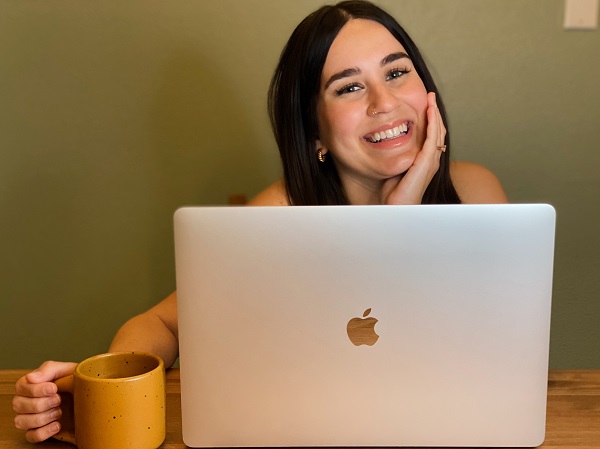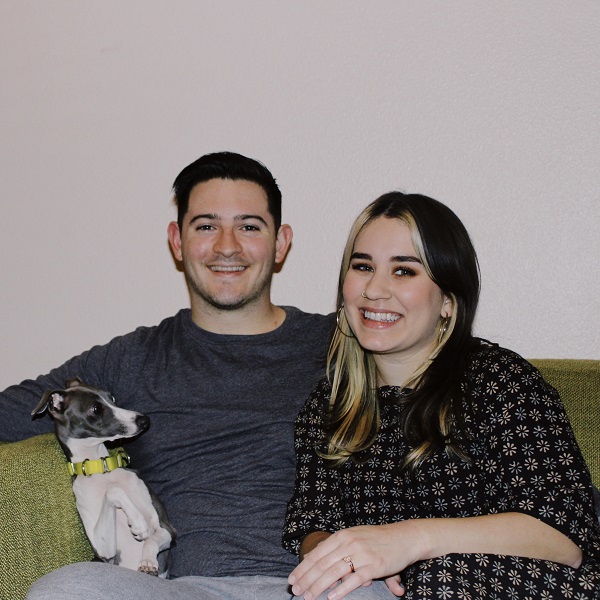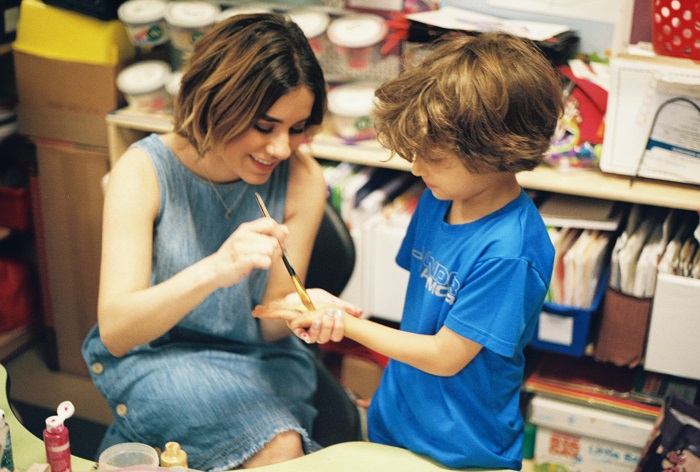
After earning a degree in early childhood education, Janessa Poole realized that while she loved lesson planning and designing visual learning aids for the classroom, she didn’t particularly enjoy the instructional aspect of teaching. She decided to stay in the restaurant industry for a few years to figure out what she wanted to do next. She wanted to find a career path where she could combine her love of psychology and design. Now that’s she a UX designer, she’s finally found it.
In fact, her current role at Reforge, an education company that helps mid-career professionals improve their marketable skills in product design, marketing strategy, customer retention, and more, she can also draw on her prior background in education.
“I feel so lucky that I had the bravery to push forward and pursue something that was new and scary because I think it fills my cup every single day,” she said. “It brings me so much joy to be in this crazy industry.”
Shortly after starting the UI/UX Career Track at Springboard, Janessa was diagnosed with obsessive compulsive disorder (OCD). She struggled to finish her assignments on time and remain focused, but with the self-paced curriculum and support from her mentor, Janessa pulled through. For her capstone project, she even prototyped an app called OCDFree to help people with OCD learn more about the disease, find psychological counseling services, and build a community with other people who are living with the condition.
Yes. I got my degree at UT Austin in early childhood education. I loved the visual design aspect of teaching early childhood kids, creating deliverables and lesson plans. And I love the psychology of understanding how kids learn, but I didn’t like the practical aspect of being in a classroom. So after I graduated, I knew I didn't want to be a teacher, but I wasn't really sure how to use the skills I had gained to do something else. So I stayed in the foodservice industry for a few more years to figure out what I wanted to do next.
My cousin had earned a degree in industrial design. I’d always been really interested in all of the crazy sculptures and prototypes she made. So I asked her about her work and took a peek at her portfolio. So then I took a mini-course at Design Lab [a design school run by the University of Texas at Austin] but I didn’t enjoy it that much. I was looking for alternatives when I came across Springboard.

I knew that I loved psychology and design, but education wasn't quite the right path for me. After learning UI/UX at Springboard, I just really knew this was exactly what I needed to be doing. It’s the perfect cross-section of the two things I love: understanding how people think and learn and interact with things, and understanding how art and design can impact that experience.
Right now I work at Reforge, a tech education company that helps mid-career professionals in tech understand what makes a successful career path and how they can beef up their skillsets in product management, marketing, and so on. This job ended up being the perfect combination of my degree in education and my new certification in UI/UX from Springboard. My job now is to design visuals to illustrate the content in these programs. Right now I'm so happy where I am and so honored that I still get to work in the education field, even in such a different way.
The reviews were really good. Springboard offered a pretty robust curriculum, mentorship, and having access to actual industry knowledge rather than just reading books or articles or things like that. These are the things I really appreciated having, especially my mentor, Radu Vucea [co-founder and director of product design at ixperi]. He’s a really talented mentor and he opened his own design school, which is booming now.

It was very genuine. I had a lot of mental health struggles in my personal life when I started the course at Springboard, so I would finish part of an assignment or do just one assignment and then stop. When life is hard, it's hard to finish things, but Radu was always there to offer support and encouragement, and also take what I could give and help me grow from that. And then, as life improved, I was able to catch up really quickly. I owe a lot of it to him because he was never judgemental and he was there as a resource and a guiding force.
I was. It really worked out well. I think I needed that to be successful.
I had been recently diagnosed with OCD and it was really challenging to find resources, treatment, and general advice. The statistics show that people who struggle with OCD can spend years trying to find adequate science-based treatment. My goal with OCDFree was to make that journey easier and to create a community, to refer people to doctors and other professionals, as well as resources like articles and videos. It was a prototype, but it was an exciting first capstone product and a very personal one.
When I created the prototype, it was very generic aesthetically. It had a color palette, visuals, and everything matched, but I didn’t create an in-depth prototype. But in my research, I revisited a lot of the resources I had personally used and assessed the value that they could bring users.

The goal was to have resources for your own personal understanding of what you're going through, and access to a database of therapists, doctors, psychiatrists, and psychologists. The third piece was the community--having the opportunity to connect with people who are going through the same thing and learn from them, grow with them.
It was really hard. I was job searching during the pandemic, and, at the same time, a lot of people in the tech industry are gravitating towards UI/UX, so it’s a pretty saturated market.
When you’re just starting out, finding a job can be really difficult and discouraging. But in the end, I ended up exactly where I needed to be. Although it felt like it took forever to find a job, it was only three months in the end.
It was miraculous. They chose me. I received a message from somebody at Springboard, who told me “This person saw your portfolio and really liked it and they want to talk to you." I had no idea what this company was. And I had just come out of a very difficult, weeks-long interview process that went poorly in the end, so I was a little bitter after that. So I scheduled a call with all the certainty in the world that it was not going to work out. And then I heard about Reforge I spoke to my now-boss and learned about his ideology, the company, and the role itself--and I thought, this is really cool.
They had me do what they call a simulation, where they hand you a bite-sized amount of the work you'll be doing in that role and see how you do with it. So I was given a document with some information in it and then they asked me to create 10 or fewer slides to visually represent the content. After that exercise, I was like, "I need this job. This is the place for me to be. I love doing this." Luckily, they felt the same way.
Definitely the mentorship. Radu helped me grow and enhanced my understanding of the industry. He also helped me discover my personal style and understand what it means to have an eye for web and app design. The career coaching was wonderful as well, it helped keep me on track because I had to document everything.
Document everything when you're doing your projects because you don't know what's going to be a valuable insight or deliverable until the very end. Also, keep things really concise because when people are flipping through hundreds of portfolios they don't have the time to read a long narrative. Be intentional and consider the user when you're doing writeups for your projects because that's what these people want to see.
Absolutely go for it. It's scary and hard to make that change, but there is so much joy to be had in UI/UX if you love design and if you love people. Every day, I am so happy to be doing what I'm doing. I feel so lucky that I had the bravery to push forward and pursue something that was new and scary because I think it fills my cup every single day. It brings me so much joy to be in this crazy industry.









